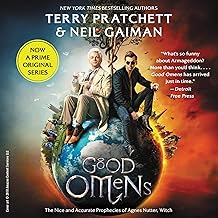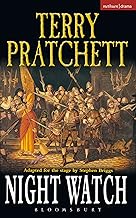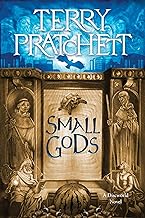
How to Read Terry Pratchett's Books on Best fantasy books
How to Read Terry Pratchett's Books on Best Fantasy Books
Estimated Reading Time: 10-12 minutes
Introduction
Terry Pratchett, one of the most beloved authors in contemporary fantasy literature, carved a niche for himself with his unique blend of humor, satire, and profound philosophical insights. Born in 1948 in Beaconsfield, England, Pratchett began his writing career at a young age and eventually created the expansive Discworld series, which includes over 40 novels. His works are not just entertaining tales; they tackle complex themes such as morality, religion, and the nature of humanity, making them essential reading for anyone interested in the best fantasy books.
Pratchett's perspective is particularly valuable because he combines the fantastical with the absurd, reflecting real-world issues through the lens of humor and fantasy. This approach allows readers to engage with serious topics in a way that is both accessible and thought-provoking. His works resonate with readers from various backgrounds, providing a rich tapestry of ideas that remain relevant in today's society.
Why Terry Pratchett's Perspective Matters
Terry Pratchett's contributions to the fantasy genre are distinguished by his keen observations on human nature and society. Unlike many of his contemporaries, who often focused on epic battles and grand quests, Pratchett's narratives frequently explore the mundane aspects of life, highlighting the absurdity of human behavior. His unique insights into morality, belief, and the human condition set him apart from other authors, making his works not only entertaining but also deeply reflective.
Pratchett's lasting impact is evident in the way he challenges readers to think critically about the world around them. His humor often serves as a vehicle for social commentary, allowing readers to confront uncomfortable truths while still enjoying the story. This duality is what makes his works essential reading for anyone interested in the best fantasy books.
Overview of Recommended Books
Good Omens
Main Themes and Arguments: Co-written with Neil Gaiman, "Good Omens" is a comedic take on the apocalypse, featuring an angel named Aziraphale and a demon named Crowley who team up to prevent the end of the world. The novel explores themes of good versus evil, free will, and the absurdity of organized religion.
Historical Context and Significance: Published in 1990, "Good Omens" emerged during a time when apocalyptic narratives were gaining popularity, particularly in the wake of the Cold War. Pratchett and Gaiman's collaboration offered a fresh perspective, blending humor with critical commentary on religious dogma.
Key Insights and Takeaways:
- The Nature of Good and Evil: The novel suggests that good and evil are not absolute; rather, they exist on a spectrum influenced by individual choices.
- The Importance of Free Will: Pratchett emphasizes that humanity's ability to choose is what truly defines morality.
- Satire of Religious Institutions: The book critiques the rigidity of organized religion, encouraging readers to question dogma and think for themselves.
Why Read This Book: "Good Omens" is essential for understanding the interplay between fantasy and philosophy, making it a must-read for anyone interested in the best fantasy books. Its humor and wit make it accessible, while its deeper themes offer substantial food for thought.
The Night Watch
Main Themes and Arguments: In "The Night Watch," Pratchett delves into themes of power, justice, and the complexities of leadership through the story of Sam Vimes, a cynical police officer who is thrust back in time. The novel examines the moral dilemmas faced by those in authority and the impact of societal structures on individual choices.
Historical Context and Significance: Published in 2002, this novel reflects the post-9/11 world, where issues of governance and morality were at the forefront of public discourse. Pratchett's exploration of these themes resonates with contemporary concerns about authority and justice.
Key Insights and Takeaways:
- The Burden of Leadership: Vimes' journey illustrates that true leadership often involves making difficult choices for the greater good.
- The Nature of Justice: The book challenges readers to consider what justice means in a flawed system and the importance of personal integrity.
- The Role of History: Pratchett emphasizes the cyclical nature of history, suggesting that understanding the past is crucial for shaping a better future.
Why Read This Book: "The Night Watch" offers a profound exploration of moral ambiguity and the responsibilities of leadership, making it a vital addition to the discourse on best fantasy books. Readers interested in social justice and ethical dilemmas will find it particularly rewarding.
Small Gods
Main Themes and Arguments: "Small Gods" tackles the nature of belief, religion, and the power of individual faith through the story of a god who has lost his followers. The novel questions the authenticity of religious institutions and the essence of true belief.
Historical Context and Significance: Published in 1992, "Small Gods" reflects the growing skepticism towards organized religion in the late 20th century. Pratchett's narrative serves as a critique of dogmatic beliefs and the manipulation of faith for power.
Key Insights and Takeaways:
- The Essence of True Belief: The novel emphasizes that genuine faith comes from personal conviction rather than institutional pressure.
- Critique of Dogma: Pratchett challenges readers to question the validity of religious practices that prioritize power over spirituality.
- The Power of Individual Action: The story illustrates that individuals can effect change through their beliefs and actions, regardless of external influences.
Why Read This Book: "Small Gods" is essential for anyone exploring the philosophical underpinnings of belief and religion within the fantasy genre. Its thought-provoking themes make it a powerful commentary on the nature of faith and morality.
How These Books Complement Each Other
Together, these three works showcase the multifaceted nature of Pratchett's exploration of fantasy and philosophy. "Good Omens" provides a humorous examination of good and evil, while "The Night Watch" delves into the complexities of leadership and justice. "Small Gods," on the other hand, challenges readers to reflect on the nature of belief and the power of individual conviction.
Reading these books in conjunction allows for a deeper understanding of how Pratchett weaves philosophical inquiries into his narratives, creating a rich tapestry of ideas that resonate across different contexts.
Who Would Benefit from Reading These Books
These works are ideal for a diverse audience:
- Students and Academics: Those studying literature, philosophy, or religious studies will find valuable insights and critical perspectives.
- General Readers: Anyone interested in fantasy literature will appreciate Pratchett's humor and depth.
- Professionals Seeking Practical Wisdom: Leaders and decision-makers can glean lessons on morality and ethics from Pratchett's characters.
- Individuals Seeking Personal Growth: Readers looking for self-improvement will benefit from the philosophical reflections embedded in the narratives.
Recommended Reading Order
- Start with: Good Omens - Its humor and accessible themes make it a perfect introduction to Pratchett's style and philosophical inquiries.
- Continue with: The Night Watch - This book deepens the exploration of moral complexity and leadership, building on the themes introduced in "Good Omens."
- Advanced reading: Small Gods - This work challenges readers to confront their beliefs and offers a more profound philosophical reflection on faith and morality.
Tips for Getting the Most Out of Each Book:
- Take notes on key themes and insights as you read.
- Discuss the books with friends or in a reading group to enhance understanding.
- Reflect on how the themes relate to contemporary issues in society.
Conclusion
Terry Pratchett's contributions to the realm of fantasy literature are invaluable, offering readers a unique blend of humor and profound philosophical insights. His works encourage us to reflect on our beliefs, the nature of good and evil, and the complexities of human behavior. By exploring "Good Omens," "The Night Watch," and "Small Gods," readers can gain a comprehensive understanding of Pratchett's approach to the best fantasy books.
As you embark on this literary journey, allow Pratchett's wit and wisdom to inspire you. Dive into these works and discover the timeless relevance of his ideas, which continue to resonate in our modern world. Happy reading!
Tags: #Terry Pratchett #Best fantasy books #Philosophy #ReadingGuide #ClassicLiterature #Wisdom
Featured Books

Good Omens
by Terry Pratchett
Published: 1990
The world will end on Saturday. Next Saturday. Just before dinner, according to The Nice and Accurate Prophecies of Agnes Nutter, Witch, the world's only completely accurate book of prophecies written in 1655. The armies of Good and Evil are amassing and everything appears to be going according to Divine Plan. Except that a somewhat fussy angel and a fast-living demon are not actually looking forward to the coming Rapture. And someone seems to have misplaced the Antichrist.Put New York Times bestselling authors Neil Gaiman and Terry Pratchett together . . . and all Hell breaks loose.Note: Title is available in different packaging, however content is the same. Read more

The Night Watch
by Terry Pratchett
Published: 2002
"Night Watch turns out to be an unexpectedly moving novel about sacrifice and responsibility, its final scenes leaving one near tears. . . Terry Pratchett may still be pegged as a comic novelist, but . . . he’s a lot more.” — Washington Post Book WorldGetting knocked back in time thirty years, Sam Vines, Commander of the Ankh-Morpork City Watch experiences a day like no other in which past, present, and future collide with hilarious—and poignant—results in this rollicking Discworld adventure from Terry Pratchett.One moment Commander of the City Watch Sam Vimes is chasing a murderer across the rooftops of Ankh-Morpork. The next, he’s lying in the street below, naked—and back in his own tough past thanks to a lightning strike and a group of meddling, time-manipulating monks.It’s a dark Discworld that is all too familiar. Worse, the cop-killing psychopath he’d been pursuing has been transported back with him, and it’s the eve of a deadly street rebellion that took a few good (and not so good) lives. Vimes is determined to do his duty— track down the murderer and change the outcome of the rebellion. By changing history he might just save some worthwhile necks, and steer a novice watchman straight—an impressionable young copper named Sam Vimes.But if he succeeds, Sam knows it could cost him the future—including the job and the family he loves.The Discworld novels can be read in any order but Night Watch is the sixth book in the City Watch series. The series includes:Guards! Guards!Men at ArmsFeet of ClayJingoThe Fifth ElephantNight WatchThud!Snuff Read more

Small Gods
by Terry Pratchett
Published: 1992
“Pratchett’s Monty Python-like plots are almost impossible to describe. His talent for characterization and dialogue and his pop-culture allusions steal the show.”—Chicago TribuneNo sacred cow is left unskewered in this intriguing installment in Sir Terry Pratchett's internationally bestselling Discworld series, a divinely funny take on organized religion, petty gods, and the corrupting thirst for power.Religion is a competitive business in the Discworld. Everyone has their own opinion and their own gods of every shape and size—all fighting for faith, followers, and a place at the top. So when the great god Om accidentally manifests as a lowly tortoise, stripped of all divine power, it’s clear he’s become less important than he realized.Om needs an acolyte and fast. Enter Brutha, the Chosen One—or at least the only One available. He’s a simple lad whose highest ambition is tending his melon patch—until he hears the voice of a god calling his name. A small god for sure. But bossy as Hell.Brutha wants peace, justice, and love—but that’s hard to achieve in a world where religion means power, money is worshipped, and corruption reigns supreme. . . .The Discworld novels can be read in any order but Small Gods is a standalone. Read more